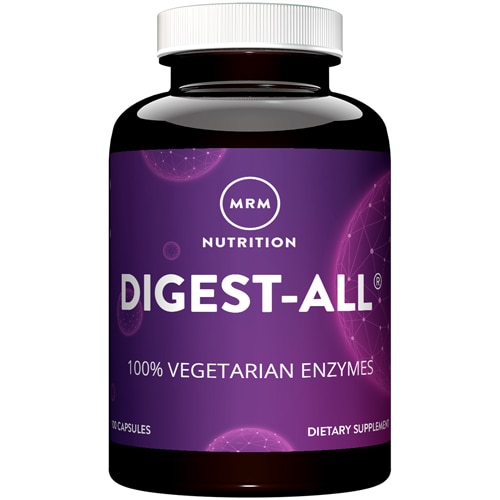Digestive issues of all kinds – from bloating and gas to heartburn, nausea, general stomach pain and more – are now one of the leading health concerns among people of all ages. While diet plays a big part, it isn’t the only culprit. Sure, what we eat has a direct effect on how we feel and process our food, but there’s much more to digestion than what we consume each day.
Hormones, stress, food intolerances, supplements, medication, meal sizes and meal timing can all affect our digestion. Serious health issues, such as autoimmune disease, candida overgrowth and deficiencies, can also be linked to tummy troubles.
No matter what kinds of issues you’re struggling with, there are some things you can do to improve your digestion rather quickly. Here are 10 stategies to get started.
1. Take a digestive enzyme supplement
Digestive enzymes help process and break down our food more efficiently. While your body produces them on its own, and they’re present in many foods you eat, a digestive enzyme supplement is something to consider if you’re looking for extra support.
Take it before or after meals—or, you can take it between meals if you have indigestion, nausea or your digestion feels a little sluggish. Look for a formula with added herbs such as fennel, peppermint and ginger for added comforting benefits.
2. Take a high-quality probiotics supplement
Gas, bloating, constipation, diarrhea, nausea, and food intolerances can all be influenced by an imbalance in gut bacteria. Thankfully, probiotics help get things back on track as they work to promote healthy levels of good microorganisms in the body.†
Probiotics can help break down our food so nutrients can be properly processed, and they may help support healthy immune function, as well.† Look for a product containing DDS-1, which is a resilient, scientifically validated strain of L. acidophillus.†
3. Drink peppermint tea with or after meals
Peppermint tea does a number of wonderful things for digestion. First, it helps relieve nausea, gas and constipation. Second, it can help decrease stress levels, which is a crucial factor for optimal digestion.† When we’re stressed or anxious, gut health can suffer almost immediately.
Sipping peppermint tea with meals is a calming and proactive way to keep issues at bay. Be sure to drink it warm rather than cool, since warm beverages are generally better for digestion.
4. Eat pineapple before meals
Pineapple is more than just a tasty fruit. It’s a source of bromelain, one of many digestive enzymes that help break down protein and can help with nausea and indigestion. Pineapple is also considered an anti-inflammatory food, and it’s a source of vitamin C, which can have helpful (sometimes helpful!) laxative effects in the body.
Frozen or fresh pineapple both work. Start with ½ cup per day, or eat a few slices before your meals.
5. Choose easy-to-digest carbs
Carbs generally digest a little easier than protein and fat; however, if you’re struggling with high-fiber foods, try eating some simpler, easier-to-digest forms of healthy complex carbs. Good choices that generally digest easily are hot Kamut cereal, sprouted grain toast, wild rice, buckwheat cereal, sweet potatoes, winter squash, pumpkin and rolled oats.
Avoid refined flour, processed sugary foods and added sweeteners which can all decrease healthy gut bacteria levels and can cause nausea along with constipation. High-fiber foods such as cruciferous veggies, excessive amounts of raw salad or greens, or too much fat at meals can also cause many issues for people. Don’t fear whole food carbs—they can be your best ally for healthy digestion!
6. Go to bed earlier
What does sleep have to do with digestion? The answer is a lot. Sleep is one of the most influential factors of our digestive processes (especially when we haven’t gotten enough of it!). Sleep influences our hormones, which directly impact digestion.
A lack of sleep contributes to increased levels of the stress hormone cortisol which can increase our hunger and lead to overeating and digestive problems. Our bodies also need at least 8-9 hours away from food each night so they can clean house and eliminate wastes.
7. Wait until you’re hungry to eat
There’s no rule that says you have to wake up and eat right away. In fact, wait until you’re hungry before you actually have your first meal, or any meal after that. Giving your body a break from food can be one of the best things you do for your digestive system, especially in the morning. It can help improve elimination in the mornings, can help you become more in tune with your body’s signals and can help prevent eating when you’re system isn’t ready for food yet.
Even if it’s noon before you feel hungry, that’OK! Let your body tell you when it’s ready for food, and digestion will likely improve.
8. Keep a food journal
Keeping a food journal can be helpful for more than just maintaining your weight; it’s also great for identifying times when you’re eating problematic foods. Write down what you eat at meals for the next seven days—and do it right after you eat. Then note any dietary issues that you suffer up to 4 hours after your meal and before your next one.
Bloated after your lunch salad? Perhaps your salad had cheese on it or too much sodium, which can both cause bloating and digestive problems. Constipated after dinner? Perhaps you had too much dairy or meat and not enough veggies. Noting the changes you see may help you spot problems that are causing your issues so you can fix them right away.
9. Learn to love lemons
Lemons are full of enzymes that help promote smooth digestion, relieve bloating and can help reduce constipation. Lemons are also a good source of vitamin C.
Try to drink a cup of warm water and the juice of one lemon each morning right after you wake up. Lemon water is great at the start of the day, or you can drink it as a refreshing nightcap in the evening. Lemon can also be added to tea if you enjoy tea with your meals.
10. Eat more real, whole foods
Our bodies prefer real fresh food such as vegetables, fruits, whole grains, nuts, seeds and lean protein sources instead of large amounts of sodium, refined ingredients, unhealthy fat and sugar. Processed foods like cold cereal, protein bars, trendy cookies and chips, pasta and the like are still typically made with too much sodium or refined ingredients that aren’t good for digestion. Keep it simple and your body will thank you!
Besides these tips, you can also try doing more gentle activities such as walking and yoga, eating more slowly at meals, eliminating spicy foods and eating smaller portions at mealtime. Try out these tips to improve your digestion this week and let us know how they work for you!
†These statements have not been approved by the Food and Drug Administration. These products are not intended to diagnose, treat, cure or prevent disease.




